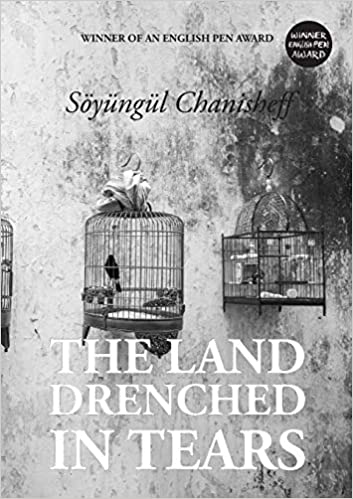The Land Drenched in Tears
Posted by jonathanfryer on Wednesday, 5th August, 2020
 Human rights abuses against Muslim minorities in Xinjiang have been highlighted in UK media in recent weeks, but the phenomenon is hardly new. In fact, ever since the Chinese Communist Party gained power in 1949 the government in Beijing has sought to colonise this “New Frontier” with Han Chinese and to suppress Turkic culture and Islamic beliefs. The parallels with Tibet are obvious, but whereas Tibet has received a huge amount of international attention — notably since the Dalai Lama and many of his followers fled abroad in 1959 — Xinjiang remained largely ignored. I travelled there in 1994 and again in 2013, startled and dismayed by the intensification of the sinicisation process that had occurred over the intervening two decades. But until I read Söyüngül Chanisheff’s The Land Drenched in Tears (Hertfordshire Press, £24.50), I had not realised the true horror of much of the suffering of local peoples for more than half a century. Chanisheff is Tatar, and trained in medical school where she became involved in a youthful cell campaigning for an independent “East Turkestan”. This led to her imprisonment and subsequently long years of slave labour in the countryside under a surveillance regime that deprived her of her civil rights and made her an easy target for the bullies and sadists that arise in such totalitarian situations like flies around a dung heap. Her privations were soul-destroying, especially in the extreme heat of summer and extreme cold of winter, malnourished, often beaten and even more frequently paraded before baying mobs as a “class enemy”.
Human rights abuses against Muslim minorities in Xinjiang have been highlighted in UK media in recent weeks, but the phenomenon is hardly new. In fact, ever since the Chinese Communist Party gained power in 1949 the government in Beijing has sought to colonise this “New Frontier” with Han Chinese and to suppress Turkic culture and Islamic beliefs. The parallels with Tibet are obvious, but whereas Tibet has received a huge amount of international attention — notably since the Dalai Lama and many of his followers fled abroad in 1959 — Xinjiang remained largely ignored. I travelled there in 1994 and again in 2013, startled and dismayed by the intensification of the sinicisation process that had occurred over the intervening two decades. But until I read Söyüngül Chanisheff’s The Land Drenched in Tears (Hertfordshire Press, £24.50), I had not realised the true horror of much of the suffering of local peoples for more than half a century. Chanisheff is Tatar, and trained in medical school where she became involved in a youthful cell campaigning for an independent “East Turkestan”. This led to her imprisonment and subsequently long years of slave labour in the countryside under a surveillance regime that deprived her of her civil rights and made her an easy target for the bullies and sadists that arise in such totalitarian situations like flies around a dung heap. Her privations were soul-destroying, especially in the extreme heat of summer and extreme cold of winter, malnourished, often beaten and even more frequently paraded before baying mobs as a “class enemy”.
 When the Cultural Revolution began in 1966 things went from bad to worse. She witnessed so much cruelty and torture and many killings, as well as listening to heart-breaking testimony from others. This is all set down in the nearly 400 pages of her book (translated from Uyghur by Rahima Mahmut), the catalogue of misery and inhumanity so searing that I found I could only read a few passages at a time. The forced evacuation of Muslim residents from cities in the region so Han Chinese could move in; the desecration of mosques and burning of Korans; infanticide in maternity hospitals where nurses were instructed to kill at least one baby a day or face the consequences. This is grim but essential reading for anyone who wants to understand what has happened in that remote region of the world. Fortunately the book does have a personally happier ending for the author, as despite her “criminal record” she found a suitable man to marry and started a family, later seizing the opportunity to emigrate to Australia. The title of Söyüngül Chanisheff’s memoir may sound melodramatic, but actually it is an understatement.
When the Cultural Revolution began in 1966 things went from bad to worse. She witnessed so much cruelty and torture and many killings, as well as listening to heart-breaking testimony from others. This is all set down in the nearly 400 pages of her book (translated from Uyghur by Rahima Mahmut), the catalogue of misery and inhumanity so searing that I found I could only read a few passages at a time. The forced evacuation of Muslim residents from cities in the region so Han Chinese could move in; the desecration of mosques and burning of Korans; infanticide in maternity hospitals where nurses were instructed to kill at least one baby a day or face the consequences. This is grim but essential reading for anyone who wants to understand what has happened in that remote region of the world. Fortunately the book does have a personally happier ending for the author, as despite her “criminal record” she found a suitable man to marry and started a family, later seizing the opportunity to emigrate to Australia. The title of Söyüngül Chanisheff’s memoir may sound melodramatic, but actually it is an understatement.

Leave a comment